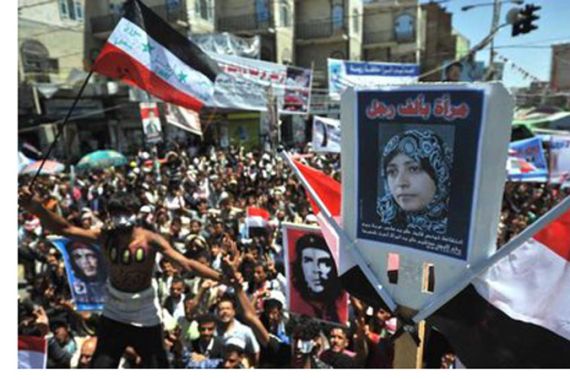A Nobel for the Arab Spring
Tawakul Karman’s acquisition of a Nobel Peace Prize helps legitimise protest as valid resistance in Arab world.

 |
| Yemeni women’s rights and democracy activist Tawakul Karman is one of three 2011 Nobel Piece Prize recipients [EPA] |
The shared Nobel Peace Prize given to human rights activist Tawakul Karman is rightly deserved. It’s more deserved than the award given to Obama in 2009. Partly, it is an accolade for the entire Arab Spring and its unsung heroes. Partly, it recognises the revolutionary kudos of woman power in the advent of the Arab Spring.
However, there are a few legitimate questions that must be posed. In particular, to what extent does the award understate the power of the powerless?
Where there is a will…
The 32-year-old Yemeni female activist name literally means “determined” and “endowed with resolve, initiative and will”. And Tawakul lives up to her name. This perhaps explains why a petite female Islamist mother of three has been steadfast in her non-violent activism and tenacity, sustaining a sit-in since the eruption of the Yemeni protest movement several months ago.
Yemeni friends describe her as audacious, courageous, street smart, sagacious, gracious and down to earth.
Probably what makes Tawakul stand out is her healthy position towards dogma. Although ideologically an Islamist, in practise she favours a brand of civic politics that champions equal protection for all even under secular arrangements.
And perhaps this is the ideal type of Islamist politician that the Arab Spring needs right now for mature democratic fruition – a visionary woman from the reform and Muslim Brotherhood-linked al-Islah party.
The prize implicitly at least has shifted the global lens through which Islamists are routinely depicted as fire and brimstone religious activists. Perhaps this is a recognition that Islamists are legitimate pro-human rights and democracy agents. In the Yemeni context, there is an additional subtlety. Whilst the prize seems to bestow a legitimacy upon this brand of Islamism, it indirectly rebuffs the violent brand of Islamism deployed by the likes of al-Qaeda.
Whether we like it or not, since the Arab Spring burst forth, political Islam has inherently been a force to be reckoned with in the mobilisation and organisation for human rights and good government. The slogan “Islam is the solution” may now be somehow unwittingly validated by the powers-that-be who, until recently, avowedly worked to deny the claimants of this bottom-up type of politics a margin of existence.
Tawakul is a woman whose actions speak louder than the Nobel Prize awarded to her. Her struggle preceded the Yemeni uprising, galvanising both men and women for greater and equal citizenship. Whether in penning free opinion or protesting against Abdullah Saleh’s authoritarianism or leading the NGO Women Journalists Without Shackles, Tawakul’s intrepid activism has gone against the grain of a deeply patriarchal society.
Her activism has undermined the existing stereotypes about Yemeni and Arab women as well as veiled Islamist women. This is a case that showcases that the veil and Islamist identity do not stand in the way of the visibility, moral protest and democratic struggle.
Tawakul … Yemen’s emerging Aung San Suu Kyi?
It’s a stroke of genius on the part of the Nobel committee to honour Tawakul. The feminist touch to expand the club of female laureates, especially from the Third World, is welcome on this occasion. Women are steadfast participants in the struggle against the ills of poverty, autocracy, inequality and war.
However, the beauty of the Arab Spring and moral protest in the Arab world is that it has been generally leaderless, nameless and without any ‘cult’ figures.
The Nobel Prize may be akin to cloning Aung San Suu Kyi in Yemen as an equivalent moral force and a face of democratic hope around which anti-authoritarian protests and forces could rally. There is a tinge of artificiality in the seeking to sculpture a heroine out of Tawakul in Yemen’s Arab Spring as well as ‘manufacturing’ consensus around her newly acquired status and to lend global legitimacy to dissent against the existing order.
There are two positives in awarding the Peace Prize to Tawakul: first, her struggle and sacrifice is redeemed; second, protest – which has always worried Western governments as unruly and potentially threatening to their interests, client regimes and security arrangements – is finally recognised to be legitimate and acceptable in the entire Arab world.
|
|
From this perspective the Nobel goes to Tawakul; but the award may also be intended as symbolic recognition of the fervour of the Arab Spring in its entirety.
Nobel … to what end?
There is a negative side. The Nobel Peace Prize almost names a price for the Arab Spring, itself a priceless moral protest movement that can be measured only by its immaterial content and normative ethos. The struggle for freedom has no price and nor does the Arab Spring nor can any global force name a price or award a prize for the Arab Spring.
The rewards for the Arab Spring are an inner force generated within. The international community’s show of support is welcome but some of the attempts to ‘contain’ ‘commodify’, ‘co-opt’ or ‘buy’ the Arab Spring are unsavoury properties of a global consumer culture driven by the logic of the market and the white man’s burden to civilise all things other.
A cynic can not help but regret the reduction of a dynamic and multifarious movement into a single locus – Tawakul. One dares not name any of the equally deserving men and women, Syrian, Egyptian, Bahraini, Sudanese, Libyan, Tunisian, and Yemeni.
Not many Arabs over the years have been included in the elite club of Nobel Laureates, even the awarding of the Nobel for the sake of having a token recognition of the cause of the Arab Spring may prove to be counterproductive. Tawakul’s constituency is largely composed of conservative and religious men and women. There is also a dynamic of tall poppy syndrome that can further undermine Tawakul’s support within Yemen.
Nobel-ity
This particular Nobel expands the politics of recognition to a single female individual as well as to an entire movement. But ambiguity is inevitable. For, this recognition through the naming of a single actor oddly enough restricts this very recognition by ‘fixing’ it in a single person.
The elan of moral protest in the case of the Arab Spring is that it has persistently lacked a Che, a Khomeini or an Aung San Suu Kyi. The gain is the plurality embodied in a broad movement driven by ideals not mortals or ideologies.
There are thousands of voices from within the Arab Spring that carry on the moral flame of protest against corrupt and authoritarian political elites. They are all Tawakul. The nobility of the struggle waged by all these free Arabs is not up for grabs.
Nobel or no Nobel, the march for Arab freedom shall stay the course as Bouazizi, Tawakul and others keep on displaying. The nobility of these freedom-seeking acts in a many Tahrir Square as an essence will never be captured any amount of Nobel-ity.
Dr Larbi Sadiki is a Senior Lecturer in Middle East Politics at the University of Exeter, and author of Arab Democratisation: Elections without Democracy (Oxford University Press, 2009) and The Search for Arab Democracy: Discourses and Counter-Discourses (Columbia University Press, 2004), and the forthcoming Hamas and the Political Process (2011).
The views expressed in this article are the author’s own and do not necessarily represent Al Jazeera’s editorial policy.
